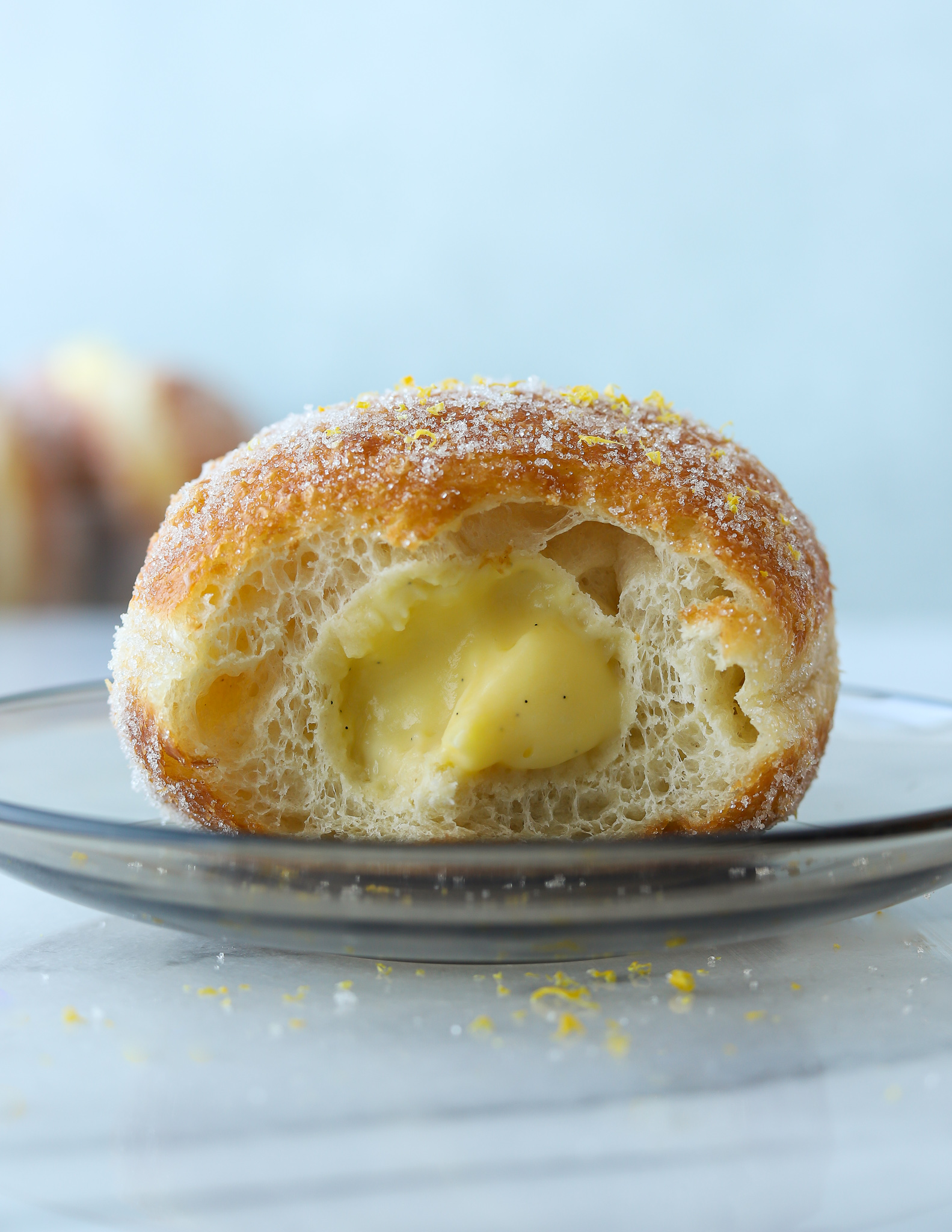Sourdough Cream Filled Doughnuts
4.5
(93)
Your folders
Your folders
Prep Time: 60 minutes
Cook Time: 30 minutes
Total: 2100 minutes
Servings: 15

Ingredients
Export 11 ingredients for grocery delivery
Instructions
Step 1
Mix sourdough starter, water, and flour in a bowl. Cover, and rise in a warm spot (75°F-78°F/24°C-26°C) for 8-10 hours, until tripled in size.
Step 2
Add the flour, stiff levain, eggs, whole milk, sugar, and salt to the bowl of your stand mixer fitted with a dough hook. Mix until just combined. It does not matter if the dough is a bit lumpy at this point. Cover, and rest/autolyse for 30 minutes.
Step 3
After the autolyse, continue mixing for 5 minutes.
Step 4
After 5 minutes, you can slowly start to add cubed, softened butter. When all the butter is added, scrape down the sides of your bowl and continue mixing at medium speed for 15-25 minutes. Do the window-pane test to check if your dough is ready.
Step 5
Transfer the dough to a clean bowl, cover, and proof in a warm spot (75°F-78°F/24°C-26°C) for 6 hours. If you don't own a dough proofer, you can keep the dough in the oven with the light turned on and the oven door slightly open.
Step 6
I like to do two gentle folds during proofing, one after 1,5 hours and one after 3 hours.
Step 7
After 6 hours, place the dough in the fridge and cold-proof for 6-8 hours.
Step 8
Start by gathering all your ingredients.
Step 9
In a bowl, whisk together egg yolks, sugar, corn starch, and salt.
Step 10
Cut the vanilla bean pod in half (lengthwise) and scrape off the vanilla bean with a knife.
Step 11
In a medium-sized pot, combine the milk and vanilla bean. Heat up over medium heat until you can see tiny bubbles forming around the edges of the pot, almost to a boil.
Step 12
Take the pot off the heat and slowly pour it over the egg mixture a little at a time while constantly whisking.
Step 13
Place a fine-mesh strainer over the pot and strain everything back into the pot. Heat up over medium heat, still constantly whisking, until the pastry cream is thick and shiny.
Step 14
Remove from heat and mix in the butter. If you're using vanilla extract, you want to mix it in now.
Step 15
Transfer to a bowl, cover with plastic wrap that is touching the entire surface of the cream. This is to prevent skin from forming on top of the pastry cream. Cool to room temperature, then place it in the fridge.
Step 16
Divide the dough into 15 equal pieces (60g each) and roll into seamless rounds. Place the shaped donuts on baking trays lined with floured parchment paper cut into about 5in/12 squares. The parchment paper pieces are for easier transfer later on. Loosely cover the trays with plastic wrap.
Step 17
Place the baking trays in the oven with the light turned on and the door slightly open. You want the temperature to be around 78°F/26°C. You can also use a proofer box if you own one. Proof the donuts for about 10-14 hours or until they've doubled in size.
Step 18
Pour oil into a Dutch Oven or heavy bottomed pot set over medium heat. Heat the oil to 180 °C-185°C/356°F-365°F. A thermometer is highly recommend to manage the temperature.
Step 19
Carefully lower the doughnuts into the oil and fry them for about 2 minutes each side. You want the top-side of the dough pieces to hit the oil first.
Step 20
Remove from oil with a metal slotted spoon and transfer to a cooling rack lined with paper towels.
Step 21
Toss the fried doughnuts in sugar while they're still warm.
Step 22
Repeat on all remaining doughnuts.
Step 23
Take your vanilla pastry cream out of the fridge and give it a good stir. Insert a small knife into the center of the cooled doughnuts (anywhere on the white line) to make a hole. With a piping bag, fill each doughnut with vanilla pastry cream.